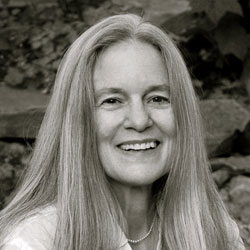By now, my mother has been pulled to the top
of many small waves, carried in the curve that curls
over, onto itself, and unknots,
again, into the liquid plain,
as her ions had first been gathered from appearances
and concepts. And her dividend,
her irreducible, like violet
down, thrown to the seals, starfish,
wolf spiders on the edge-of-Pacific
floor, I like to follow her
from matter into matter, my little quester,
as if she went to sea in a pea-green
boat. Every separate bit,
every crystal shard, seems to
be here — her nature unknowable, dense,
dispersed, her atomization a miracle,
the earth without her a miracle
as if I had arrived on my own
with nothing to owe, nothing to grieve,
nothing to fear, it would happen with me
as it would, not one molecule
lost or sent to the School Principal
or held in a dried-orange-pomander strongbox
stuck with the iron-matron maces
of the cloves. My mother is a native of this place,
she is made of the rosy plates of the shell
of one who in the silt of a trench plays
music on its own arm, draws
chords, and then the single note —
rosin, jade, blood, catgut,
siren-gut, hair, hair,
hair — I miss her, I lack my mother, such
peace there is on earth now every
tooth of her head is safe, ground down
to filaments of rock-crab fractals
and claw facets, the whole color wheel
burst and released. Oh Mom. Come sit
with me at this stone table at the bottom
of the Bay, here is a barnacle of
egg custard, here is your tiny
spoon with your initials, sup with me
at dawn on your first day — we are all
the dead, I am not apart from you,
for long, except for breath, except for
everything.
Notes on the Poem
The title "Her Birthday as Ashes in Seawater" makes pretty clear what this selection from Sharon Olds' 2020 Griffin Poetry Prize shortlisted collection Arias is about. What will reassure you that you should venture into the poem, even knowing it is about an observation in conjunction with someone's death, is that Olds will find a way to affirm life even as she looks unflinchingly at the ritual. Look no further than a purveyor of cremation urns for insights into the symbolism and significance of scattering ashes. Different faiths and traditions view cremation and the spreading of the deceased's ashes in a variety of ways, from "a way of freeing the soul or spirit", to environmental considerations to "a submission to God's will and created order, as well as a proclamation of hope in his power to raise the dead to life in an act of re-creation." All of these perspectives seem to combine in Olds' heartfelt description: "I like to follow her from matter into matter, my little quester, as if she went to sea in a pea-green boat." In her details of what is happening to her mother's ashes ... "her dividend, her irreducible, like violet down, thrown to the seals, starfish, wolf spiders on the edge-of-Pacific floor" "now every tooth of her head is safe, ground down to filaments of rock-crab fractals and claw facets" Olds manages to still be poignant amidst her clinical, verging on enthusiastic fascination with the processes under way. That poignance draws each of us in as she concludes: "we are all the dead, I am not apart from you, for long, except for breath, except for everything." Somehow, this poem is achingly appropriate as we consider the ashes of a past year we're relieved to release, knowing with both cautionary trepidation and optimism that what has been disposed of flows into the continuum of what comes next.
